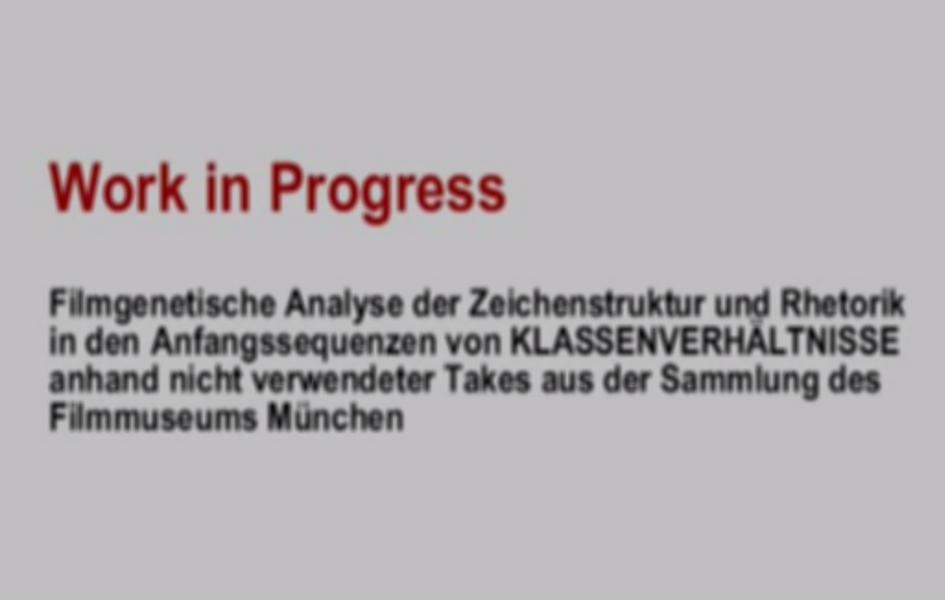
Work in Progress
1983Work in Progress
''The Filmmuseum DVD edition makes good on its billing as a study edition. The set contains the film itself, with subtitles and video transfer personally supervised by Danièle Huillet; three documentaries related to the film, and 44 production stills. The discs also contain DVD-ROM content, including the complete shooting script for the film. The making-of documentaries take 3 very different approaches to understanding the Straub/Huillet working process. Harun Farocki's Work on "Class Relations" explores the crafting of small gestures and words through the rehearsal process and shooting. Work in Progress by Klaus Kanzog and Klaus Volkmer is a 20-minute film is made up of alternate takes not used in the film, again emphasizing the small differences used by the filmmakers to create meaning. The set's gem, though, is Manfred Blank's How Merrily I Shall Laugh. The film begins with a long panning shot of a landscape cut by roads and housing developments, accompanied by the Bach Cantata that gives the film its name (BWV 205). Both the camerawork and the cantata are worthy tributes to the political agenda of Straub and Huillet's work. The cantata's lyrics, in the section excerpted by Blank:
How merrily I shall laugh when everything is thrown into confusion! When even the rocks do not stand firm and when the roofs crash down then I shall laugh merrily!
We then see Jean-Marie and Danièle speak about their work in a number of unedited takes (focusing mostly on Straub, whose fiery elaborate speech is occasionally distilled or corrected by Huillet). This film offers keys to thinking about Class Relations by opening up the concepts of construction that Straub and Huillet use in the creation of a film. For filmmakers as intensely formalist, political, and often oblique as Straub and Huillet, these insights enrich their work by showing the modes of engagement that they use in their work. At one point they describe their choices of camera placement, studiously avoiding their characters' subjectivity while giving the camera itself a subjective point of view (one they refer to as "brotherly" with respect to Karl Rossman). It's an insight that explains their attitude toward filmmaking and how we are supposed to feel - and think - about their characters. Rather than manipulate the audience into emotion, they strive to create a feeling of solidarity with their characters. This solidarity coincides with an intellectual understanding of the circumstances in which their characters live. It's also related to the other components of visual presentation used by Straub and Huillet in Class Relations, which share with Brecht a commitment to distanced understanding that also includes emotional connection. They achieve some of these distancing effects by way of pacing in shots and scenes, harsh shadows and chiaroscuro lighting, and props and sets that separate us from the idea of 'America.' The resulting brotherly distance is the essential component of Straub and Huillet's filmmaking, and what makes their work vibrant, essential, and politically astute. The chance to explore this singular point of view in such a complete study edition is not to be missed.'' [fonte: mubi]

/media/movies/covers/2015/08/work-in-progress_tNone.png)


/media/movies/covers/2015/02/tramas-do-entardecer_t12758.jpg)
/media/movies/covers/2016/03/lucifer-rising_t16408.jpg)
/media/movies/covers/2011/08/2e38ec9164bf7b9e2f12832478c491d0.jpg)
/media/movies/covers/2018/01/art_of.jpg)
/media/movies/covers/2013/02/6005022b4fcec905ce536d598b1d5f07.jpg)